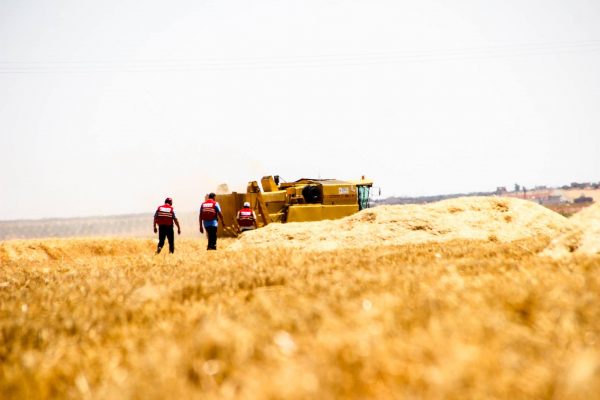Sowing Seeds with the Qatari Red Crescent

A wheat crop in one of the liberated areas.
"Initiative helps landowners boost their grain production."
Fateh al-Mousa, a 40-year-old grain trader and farmer, says that a Qatari Red Crescent scheme is working wonders to boost the local wheat market after years of war had depleted it.
Their loans cover all production needs including seeds, fertilizers, sprays and other supplies. Farmers repay the loan at the end of the season in the form of part of their crop, and the Red Crescent also buys a certain amount of wheat for more than 10 per cent of the local market value.
“Any farmer can only dream that someone would give him all the agriculture tools he needs and that they then buy the crop at a higher price than the market price,” said al-Mousa. “Thanks to this project the grain market has regained its former glory and we have maintained the quality of Syrian wheat.”
He added, “I own 20 dunams of land and didn’t hesitate to go to the local council to get a project application.
The Qatari Red Crescent is now working with the Assistance Coordination Unit and the General Organisation for Seed Multiplication to help farmers during the 2016-2017 season in various Syrian provinces.
Ammar Mohammed, 42, is director of Saraqib’s branch of the General Organisation for Seed Multiplication.
“The seed multiplication project is being repeated in Syria for the third year in a row,” he said. “It aims to promote agriculture and ensure self-sufficiency in areas outside regime control, as well as help unemployed people find jobs.”
Mohammed continued, “The area of cultivated land in the 2015-2016 season was 2,340 hectares and total production was 9,360 tons of wheat. We are waiting for this season’s harvest this season and hope to outdo last year’s figures.”
He added that last year’s project costs were estimated at 1.55 million US dollars, with this year’s investment already higher.
Ahmed Mustafa Jenki, 37, head of the local council in Hish village, said that the project had been implemented in the provinces of Idlib, Aleppo, Hama, Homs, Daraa, Damascus and Quneitra.
Applicants must provide documents from the local council to prove they own a plot of arable land between one and eight hectares in size.
“After applications are submitted at the organisation’s centres in the provinces, the job of local councils as town representatives are to distribute application forms to farmers through their agricultural offices and to make sure the organisation has the data, then writing periodic reports to the Qatar Red Crescent,” Jenki said.
Ahmed Sermani, 34, a member of Khan Shaykhun’s local council, said that this year the project had been more popular than ever.
“Such projects contribute to the support of the agricultural sector which is the main means of support for the population in many provinces, particularly the Idlib countryside, and therefore helps it become more self-sufficient.”
Haj Abu Yousef, a 67-year-old farmer from the town of Hish, missed several harvests when he was cut off from his land by the ongoing conflict. The initiative has helped him revive his farm’s productivity.
“Three years ago, I could not access my land because of the spread of the regime roadblocks, so I couldn’t harvest for two seasons,” he said. “But last season, I was able to harvest and I planted wheat thanks to the Qatar Red Crescent grant.”
